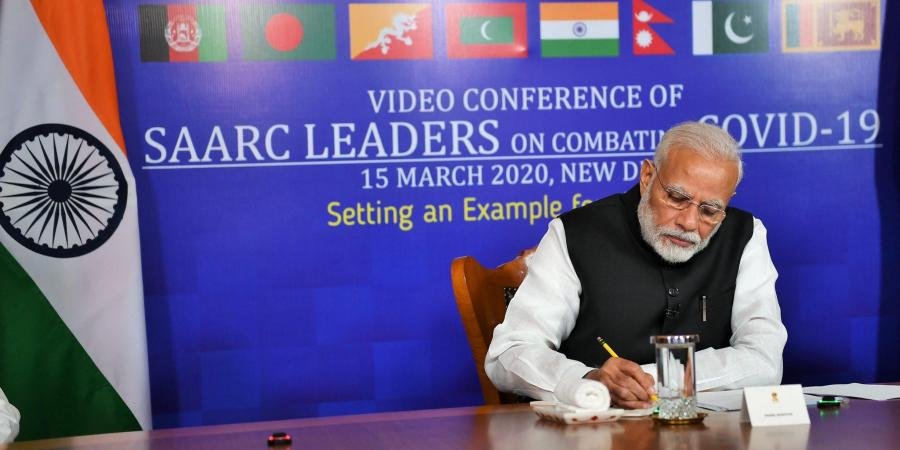
|
Getting your Trinity Audio player ready...
|
The world will be more integrationist than isolationist. India can play a key role in creating new institutions
The world is grappling with the coronavirus pandemic. People are dying in large numbers. Health care and the economy are under severe stress. Countries are turning inwards, closing borders, to protect their people. As historian Yuval Noah Harari wrote, more and more countries are becoming nationalist and protectionist, even, in some cases, even authoritarian.
But the coronavirus disease (Covid-19) has taught us a different lesson, a lesson of interdependence. The pandemic is global. The battle to combat it too must be global. We depend on each other for our health care equipment, services, transportation facilities, and, finally the vaccines, as and when they are invented. India has imported masks and testing kits from some countries, while exporting critical drugs such as hydroxychloroquine to many countries, including the United States (US). Global supply chains have become critical not only for health care products, but food and other supplies too.
In fact, one big realisation for countries from the pandemic has been that nationalism of the closed kind won’t work. Donald Trump’s “America first” nationalism didn’t work. He had to turn to China, India, and South Korea for supplies. A recurring theme of many a political scientist about American exceptionalism stands shattered today. Isolationists in all countries, including India, must realise that post-Covid-19 world will be more integrationist than isolationist.
For some time now, it has become a fad with political scientists to talk about multi-polarity. But the 21st-century world is no longer being led by countries alone. We have corporations that have bigger GDPs than many countries in the world. We have players outside the State that wield enormous influence on people across national boundaries. More important, in the era of social media, a number of power groups have emerged in the world that defy national boundaries. While nationalism as a political ideology is making a return, the world is also slipping into what author, Parag Khanna has described as hetero-polarity. It may be premature to predict the post-Covid-19 world order, but it can conclusively be said that we are moving into a hetero-polar world, with multiple State and non-State power players actively crisscrossing each other’s paths.
Prime Minister Narendra Modi has to lead India into that world after the pandemic. Modi described the situation as “World War-like”. That has catalysed the building of a narrative around World War II. Comparisons are being drawn between Modi and Franklin D Roosevelt, who led America into WWII.
Incidentally, both Roosevelt and Adolf Hitler came to power in America and Germany respectively in the same year (1932). While Hitler turned into a despot, subjecting European neighbours to domination and aggression, Roosevelt focused on rebuilding America. His “New Deal” led to massive infrastructure building such as highways, bridges and railways in America, and helped the country come out of the Great Depression of the 1930s. Expectations are that Modi will also do something similar.
Japan’s bombing of Pearl Harbor in December 1941 forced Roosevelt into the war. By the end of the war in 1945, the US emerged as the leading world power replacing Great Britain. But Roosevelt’s contribution to the War was not just about the defeat of the Axis powers. Roosevelt was instrumental in building two global institutions. Through the Bretton Woods Conference in 1944, he laid the foundation for the World Bank and International Monetary Fund. The US dollar emerged as the global currency. In April 1945, the United Nations Organization (UNO) was born with the US and its allies in the driver’s seat.
At a time when this post-Covid-19 world order appears to be in disarray, it will be tempting to expect Modi to don the Rooseveltian mantle and take the lead in building new global institutions. Institutions of the WWII vintage such as the World Health Organization and United Nations Security Council have become overtly partisan and lost their credibility today. “The United Nations is far less credible today than it has been through its history”, S Jaishankar, India’s external affairs minister said recently. With the US facing its worst nightmare, and the credibility of the Chinese leadership at an all-time low, the presumption that Modi should step into the role that Roosevelt played 75 years ago sounds logical.
Perhaps, Modi should go back, not 75 years, but by a century, and look at the role Woodrow Wilson had played at the end of World War I. “Wilson saw America’s mission in World War I not as material aggrandisement but as leading all nations into a new international community organised to achieve right ends,” wrote political scientist, Joseph Nye. Wilson’s famous 14-point charter for world peace, outlined in his address to the American Congress in January 1918, underscores the moral leadership of America.
Wilsonianism of the 20th century was represented by liberal internationalism, democracy, non-intervention, collective security and humanitarian cooperation. In the last six years, Modi has shown his commitment to all these political ideals. In fact, during his Covid-19 consultations with the G20 and South Asian Association for Regional Cooperation partners, he presented his model centred on humanism as “human-centric development cooperation”.
Modi-ism of the post-Covid 21st-century world can be borne out of the democratic and humanist credentials that he has displayed in the fight against Covid-19.
(The article was originally published in Hindustan Times on April 14, 2020. Views expressed are personal.)



